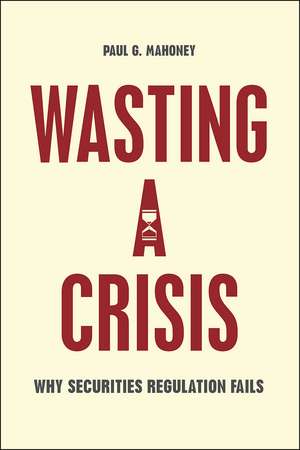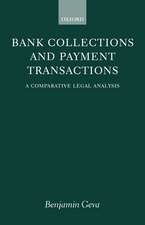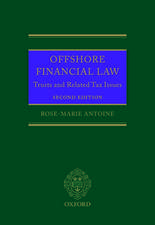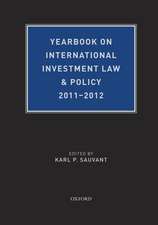Wasting a Crisis: Why Securities Regulation Fails
Autor Paul G. Mahoneyen Limba Engleză Paperback – 11 noi 2016
The recent financial crisis led to sweeping reforms that inspired countless references to the financial reforms of the New Deal. Comparable to the reforms of the New Deal in both scope and scale, the 2,300-page Dodd-Frank Act of 2010—the main regulatory reform package introduced in the United States—also shared with New Deal reforms the assumption that the underlying cause of the crisis was misbehavior by securities market participants, exacerbated by lax regulatory oversight.
With Wasting a Crisis, Paul G. Mahoney offers persuasive research to show that this now almost universally accepted narrative of market failure—broadly similar across financial crises—is formulated by political actors hoping to deflect blame from prior policy errors. Drawing on a cache of data, from congressional investigations, litigation, regulatory reports, and filings to stock quotes from the 1920s and ’30s, Mahoney moves beyond the received wisdom about the financial reforms of the New Deal, showing that lax regulation was not a substantial cause of the financial problems of the Great Depression. As new regulations were formed around this narrative of market failure, not only were the majority largely ineffective, they were also often counterproductive, consolidating market share in the hands of leading financial firms. An overview of twenty-first-century securities reforms from the same analytic perspective, including Dodd-Frank and the Sarbanes-Oxley Act of 2002, shows a similar pattern and suggests that they too may offer little benefit to investors and some measurable harm.
With Wasting a Crisis, Paul G. Mahoney offers persuasive research to show that this now almost universally accepted narrative of market failure—broadly similar across financial crises—is formulated by political actors hoping to deflect blame from prior policy errors. Drawing on a cache of data, from congressional investigations, litigation, regulatory reports, and filings to stock quotes from the 1920s and ’30s, Mahoney moves beyond the received wisdom about the financial reforms of the New Deal, showing that lax regulation was not a substantial cause of the financial problems of the Great Depression. As new regulations were formed around this narrative of market failure, not only were the majority largely ineffective, they were also often counterproductive, consolidating market share in the hands of leading financial firms. An overview of twenty-first-century securities reforms from the same analytic perspective, including Dodd-Frank and the Sarbanes-Oxley Act of 2002, shows a similar pattern and suggests that they too may offer little benefit to investors and some measurable harm.
Preț: 226.12 lei
Nou
Puncte Express: 339
Preț estimativ în valută:
43.27€ • 45.30$ • 35.80£
43.27€ • 45.30$ • 35.80£
Carte tipărită la comandă
Livrare economică 07-21 aprilie
Preluare comenzi: 021 569.72.76
Specificații
ISBN-13: 9780226420998
ISBN-10: 022642099X
Pagini: 208
Ilustrații: 1 halftone, 7 line drawings, 22 tables
Dimensiuni: 152 x 229 x 13 mm
Greutate: 0.29 kg
Ediția:1
Editura: University of Chicago Press
Colecția University of Chicago Press
ISBN-10: 022642099X
Pagini: 208
Ilustrații: 1 halftone, 7 line drawings, 22 tables
Dimensiuni: 152 x 229 x 13 mm
Greutate: 0.29 kg
Ediția:1
Editura: University of Chicago Press
Colecția University of Chicago Press
Notă biografică
Paul G. Mahoney is a David and Mary Harrison Distinguished Professor of Law at the University of Virginia School of Law.
Cuprins
Acknowledgments
Introduction
Chapter 1. Long before the New Deal
Chapter 2. The Blue Sky Laws: A Tale of Progressives and Interest Groups
Chapter 3. What the Securities Act Got Right
Chapter 4. What the Securities Act Got Wrong
Chapter 5. Did the SEC Improve Disclosure Practices?
Chapter 6. Was Market Manipulation Common in the Pre-SEC Era?
Chapter 7. Regulation of Specific Industries
Chapter 8. The Old Is New Again: Securities Reform in the Twenty-First Century
Appendix A
Appendix B
Notes
Bibliography
Index
Introduction
Chapter 1. Long before the New Deal
Chapter 2. The Blue Sky Laws: A Tale of Progressives and Interest Groups
Chapter 3. What the Securities Act Got Right
Chapter 4. What the Securities Act Got Wrong
Chapter 5. Did the SEC Improve Disclosure Practices?
Chapter 6. Was Market Manipulation Common in the Pre-SEC Era?
Chapter 7. Regulation of Specific Industries
Chapter 8. The Old Is New Again: Securities Reform in the Twenty-First Century
Appendix A
Appendix B
Notes
Bibliography
Index
Recenzii
“Mahoney casts the foundational securities laws of the New Deal in a completely different light, going behind the assertions of contemporary commentators and providing compelling evidence that we ought to question their accuracy. This is a truly important book and a timely addition of a powerful contrarian view to today’s policy discussions that tend to have a one-sided focus on the need for expanded regulation without regard to whether there is any supporting evidence for proposed policies.”
“With Wasting a Crisis, Mahoney counters the prevailing view that financial crises are the product of market failure. Rather, he suggests, regulation itself often produces problems—and, moreover, does not fix those it is intended to fix. Mahoney has an important perspective that is at odds with the conventional wisdom, and his powerful and persuasive critique is theoretically and empirically grounded with a narrative that pulls the reader in.”
“Mahoney in this brilliant book explodes the conventional wisdom uncritically adopted by policymakers and academics that lax regulation and market failures were an important contributing cause of the Great Depression. He also demolishes the related myth that the securities laws and later reforms solved the problem. This book is a must-read not just for anyone interested in the history of the securities laws but more generally for anyone interested in understanding the false narrative typically used to justify new regulatory schemes.”
“For the past twenty years, Mahoney has cheerfully punctured the conventional wisdom about corporate and financial regulation. Ranging as far back as the 1696 crisis in England and as close up as the aftermath of the Great Recession, but training his eye most carefully on the New Deal era, Mahoney shows in Wasting a Crisis that the reforms enacted after a crisis are nearly always hasty and are usually designed to deflect blame from governmental officials’ precrisis missteps. Wasting a Crisis is both erudite and readable, supported with clever empirical analysis and full of counterintuitive insights into the political process. It is a classic of economic history, a superb book by a superb scholar."











